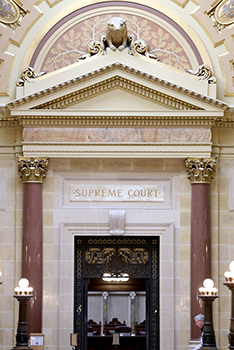 Feb. 24, 2016 – The Wisconsin Supreme Court has ruled (5-2), in State v. Parisi, 2016 WI 10 (Feb. 24, 2016), that a warrantless blood draw by police was constitutional because it was supported by exigent circumstances.
Feb. 24, 2016 – The Wisconsin Supreme Court has ruled (5-2), in State v. Parisi, 2016 WI 10 (Feb. 24, 2016), that a warrantless blood draw by police was constitutional because it was supported by exigent circumstances.
In 2012, Oshkosh police responded to a report that a male subject was irresponsive and possibly not breathing. When they arrived on scene, the resident roommates waived police inside, where they found Andy Parisi laying on the floor. He did not live there.
Someone told an officer that emergency responders gave Parisi Narcan, usually administered to counteract heroin overdoses. Another officer had prior contact with Parisi, which involved drugs. So police officers suspected drug use was involved.
Officers performed a search upstairs, where they found heroin and a marijuana pipe. The resident roommates told police that everyone had access to that room.
Parisi was transported to a hospital. His condition questionable, an officer asked Parisi to consent to a blood draw, but did not get consent. He then asked a phlebotomist to draw the blood without Parisi’s consent, to determine the presence of heroin.
The blood draw form originally said the blood draw occurred at 1:55 a.m., but that time was crossed out and 3:10 a.m. was written there instead. The officer said the blood draw was going to occur at 1:55 a.m. but his health deteriorated and it was postponed.
The officer made no attempt to obtain a warrant for the blood draw. Later, in court, the officer said he asked for the blood sample because there was evidence that Parisi may have overdosed on heroin, and it normally takes two hours to get a search warrant.
After the blood draw showed evidence of heroin, Parisi was charged with second offense possession of heroin. Parisi filed a motion to suppress the blood draw.
The state argued the blood draw was legal, because heroin dissipates at a rapid rate, so exigent circumstances existed to preserve the evidence without obtaining a warrant.
Parisi argued that under the totality of the circumstances, an exigency did not exist to justify a warrantless blood draw, citing the U.S. Supreme Court’s decision in Missouri v. McNeely, 133. S. Ct. 1551 (2013). In that case, the court ruled that the natural dissipation of alcohol, by itself, does not create an exigent circumstance.
The court denied Parisi’s motion, noting state evidence (a scientific article from 2006) that heroin dissipates more quickly than alcohol and that exigent circumstances justified the blood draw. Parisi pled no contest and appealed. The appeals court affirmed.
Majority Affirms
The majority noted that when examining exigent circumstances in this context, courts ask whether police reasonably believed that delay in procuring a warrant would risk destruction of evidence, under the circumstances known to the officer at the time.
The majority noted that officers did not know how much or when Parisi may have taken heroin, believed that obtaining a warrant would take at least two hours, and could have believed a blood draw was necessary before Parisi’s medical conditioned worsened.
“Critical evidence of heroin use in Parisi’s body was disappearing by the minute, and had been since an unknown time that evening,” Justice Ziegler wrote.
“Officer Fenhouse could reasonably conclude that waiting two hours for acquisition of a warrant, with no guarantee that Parisi would be available for a blood draw once a warrant was acquired, would mean loss of access to that evidence.”
The majority noted that this case “does not establish a per se rule that the dissipation of heroin in the blood always constitutes an exigency justifying a warrantless blood draw.”
“Any number of factual variations might change the result in a future case: police might initially have more facts at their disposal, such as the type and amount of the ingested drug, as well as the time it was ingested,” Justice Ziegler wrote.
“[O]ther jurisdictions might allow for more rapid acquisition of search warrants; scientific evidence on heroin dissipation may become clearer in the future; and so on.”
The majority also disagreed with Parisi’s reading of McNeely. Under McNeely, Parisi argued, an exigency exists only if waiting for a warrant risks destruction of the only evidence. But the majority said warrantless blood draws are legal if officers believe obtaining a warrant “would significantly undermine the efficacy” of the blood draw.
Here, the officer directing the warrantless blood draw could have reasonably believed that waiting for a search warrant would undermine evidence relating to Parisi’s heroin use, the majority noted, even if there was an inferior form of evidence available.
Dissent
Justice Ann Walsh Bradley wrote a dissenting opinion, joined by Justice Shirley Abrahamson. They argued that the majority opinion ignores McNeely, and there were no exigent circumstances justifying the warrantless blood draw on Parisi.
“[I]t is undisputed that pursuant to McNeely a per se rule authorizing warrantless blood draws based on dissipation of evidence in the blood stream is prohibited under the Fourth Amendment,” Justice Bradley wrote.
“Nevertheless, the majority creates a per se rule by inventing a new best evidence rule for every heroin case, concluding that exigent circumstances exist due to the rapid speed at which heroin dissipates in the blood.”
The dissenters noted that five to seven of the officers involved in the investigation could have obtained a warrant during the two-and-a-half hours that were available to do so.
Related Articles
Supreme Court Upholds Warrantless Search of Locked Pot Grow Room – WisBar News (Feb. 11, 2016)
McNeely and Warrantless Blood Draws: Supreme Court Clarifies Law in Trilogy – WisBar InsideTrack (Jan. 7, 2015)
What Does Missouri v. McNeely Mean for the Prosecution of Drunk Driving in Wisconsin? – WisBar InsideTrack (May 1, 2013)
